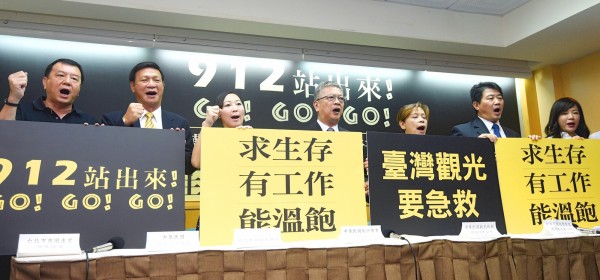《TAIPEI TIMES 焦點》 Tourism operators to stage march

Representatives of 11 tourism-related groups hold up banners at a news conference in Taipei yesterday, to promote a march on Monday to call on the government to help the ailing tourism industry. Photo: George Tsorng, Taipei Times
SOUVENIR DEFICIT: Aside from creating jobs, souvenir shops lend money to travel agencies, which might face bankruptcy if the stores demanded payment from them
By Shelley Shan / Staff reporter
Tourism industry operators yesterday announced that they plan to march in Taipei on Monday next week, with as many as 20,000 people scheduled to demonstrate, as their businesses reel from a dramatic decline in the number of Chinese tourists.
A large drop in the number of Chinese tourists last month has further aggravated the crisis, they said.
Travel Agent Association spokesperson Ringo Lee (李奇嶽) said the operators of hotels, travel agencies and tour bus companies, as well as tour guides and other tourism-related businesses, have formed a self-help group, adding that they want to tell the government that the industry is facing a crisis and it needs an immediate remedy.
“We do not have any political appeal. All we want is the means to feed ourselves and our families, keep our jobs and survive,” he said.
Chinese visitors on package tours spend an average of 7.5 days in Taiwan, and are most likely to travel throughout the nation, Lee said. Apart from hotels, travel agencies, tour guides and tour bus operators, many bakeries, souvenir shops and restaurants have also suffered due to a decrease in the number of Chinese tourists.
The repercussions of such a decline were greater than what people had expected, he said, adding that the situation highlights the need to expand the domestic tourism market.
“The domestic tourism market sees 140 million travelers per year, with about 8 percent having their tours arranged by travel agencies. Only Taiwanese and Chinese tourists visit attractions in central, southern and eastern Taiwan,” Lee said.
“International travelers only spend an average of 3.5 days in Taiwan, with 80 percent remaining in the north,” he said, adding that more needs to be done to encourage travel beyond northern Taiwan.
Taiwan Tourist Hotel Association secretary-general Jessica Yu (尤敏華) said that while hoteliers support the government’s “new southbound policy,” it should not ignore the fact that most hotels have mainly received customers from China, adding that they need time to transition to a new customer base.
The occupancy rate of hotels in central and southern Taiwan has dropped to about 50 percent because of the decline in the number of Chinese tourists, she said.
Tourism and Luxury Boutique Association chairman Chang Ya-li (張雅俐) said souvenir shops help to create thousands of jobs and at times even loan travel agencies cash, adding that the industry’s plight would only get worse if cross-strait relations deteriorate.
Many souvenir shop owners are struggling to survive because of flagging business, Chang said, adding that many face layoffs or closure.
Even more travel agencies would go bankrupt if souvenir shops demanded payments from them, she said.
The number of tour buses has increased from 12,000 in 2008 to 16,000, and the additional 4,000 vehicles cater specifically to Chinese tourists, National Joint Association of Bus for Tourists executive director Chang Tien-tsai (張天財) said, adding that 80 percent of those 4,000 tour buses are not in use.
While the number of Chinese tour groups has fallen by 80 percent, tour bus owners still need to pay for loans on the vehicles, he added.
Tourist Guide Association chairman Wu Yong-yi (伍永益) said there are about 37,000 tour guides in the nation, with close to 78 percent of them being Chinese-speaking guides.
“In the past, there were about 10,000 Chinese-speaking tour guides actively working, and each could take three to four groups per month,” he said. “Only 2,000 of them are still in business, with some leading only one or two groups per month.”
新聞來源:TAIPEI TIMES














